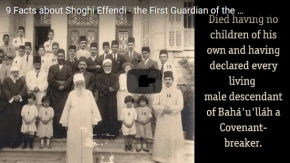He had furthermore statedin The World Order of Bahá’u’lláh that
Divorced from the institution of the Guardianship the World Order of Bahá’u’lláh would be mutilated and permanently deprived of that hereditary principle which, as ‘Abdu’l-Bahá has written, has been invariably upheld by the Law of God. “In all the Divine Dispensations,” He states, in a Tablet addressed to a follower of the Faith in Persia, “the eldest son hath been given extraordinary distinctions. Even the station of prophethood hath been his birthright.” Without such an institution the integrity of the Faith would be imperiled, and the stability of the entire fabric would be gravely endangered. Its prestige would suffer, the means required to enable it to take a long, an uninterrupted view over a series of generations would be completely lacking, and the necessary guidance to define the sphere of the legislative action of its elected representatives would be totally withdrawn.
It is worth reading and reflecting on how Shoghi Effendi describes in God Passes By the misfortunes, illnesses, and deaths of those individuals he had declared Covenant-breakers...
Mohammad Ali Bahai's brother, Mírzá Ḍíya’u’lláh, died prematurely; Mírzá Áqá Ján, his dupe, followed that same brother, three years later, to the grave; and Mírzá Badí’u’lláh, his chief accomplice, betrayed his cause, published a signed denunciation of his evil acts, but rejoined him again, only to be alienated from him in consequence of the scandalous behavior of his own daughter. Mírzá Muḥammad-‘Alí’s half-sister, Furúghíyyih, died of cancer, whilst her husband, Siyyid ‘Alí, passed away from a heart attack before his sons could reach him, the eldest being subsequently stricken in the prime of life, by the same malady. Muḥammad-Javád-i-Qazvíní, a notorious Covenant-breaker, perished miserably. Shu‘á’u’lláh who, as witnessed by ‘Abdu’l-Bahá in His Will, had counted on the murder of the Center of the Covenant, and who had been despatched to the United States by his father to join forces with Ibráhím Khayru’lláh, returned crestfallen and empty-handed from his inglorious mission. Jamál-i-Burújirdí, Mírzá Muḥammad-‘Alí’s ablest lieutenant in Persia, fell a prey to a fatal and loathsome disease; Siyyid Mihdíy-i-Dahájí, who, betraying ‘Abdu’l-Bahá, joined the Covenant-breakers, died in obscurity and poverty, followed by his wife and his two sons; Mírzá Ḥusayn-‘Alíy-i-Jahrúmí, Mírzá Ḥusayn-i-Shírázíy-i-Khurṭúmí and Ḥájí Muḥammad-Ḥusayn-i-Káshání, who represented the arch-breaker of the Covenant in Persia, India and Egypt, failed utterly in their missions; whilst the greedy and conceited Ibráhím-i-Khayru’lláh, who had chosen to uphold the banner of his rebellion in America for no less than twenty years, and who had the temerity to denounce, in writing, ‘Abdu’l-Bahá, His “false teachings, His misrepresentations of Bahaism, His dissimulation,” and to stigmatize His visit to America as “a death-blow” to the “Cause of God,” met his death soon after he had uttered these denunciations, utterly abandoned and despised by the entire body of the members of a community, whose founders he himself had converted to the Faith, and in the very land that bore witness to the multiplying evidences of the established ascendancy of ‘Abdu’l-Bahá, Whose authority he had, in his later years, vowed to uproot.
As to those who had openly espoused the cause of this arch-breaker of Bahá’u’lláh’s Covenant Mohammad Ali Bahai, or who had secretly sympathized with him, whilst outwardly supporting ‘Abdu’l-Bahá, some eventually repented and were forgiven; others became disillusioned and lost their faith entirely; a few apostatized, whilst the rest dwindled away, leaving him in the end, except for a handful of his relatives, alone and unsupported. Surviving ‘Abdu’l-Bahá by almost twenty years, he who had so audaciously affirmed to His face that he had no assurance he might outlive Him, lived long enough to witness the utter bankruptcy of his cause, leading meanwhile a wretched existence within the walls of a Mansion that had once housed a crowd of his supporters; was denied by the civil authorities, as a result of the crisis he had after ‘Abdu’l-Bahá’s passing foolishly precipitated, the official custody of his Father’s Tomb; was compelled, a few years later, to vacate that same Mansion, which, through his flagrant neglect, had fallen into a dilapidated condition; was stricken with paralysis which crippled half his body; lay bedridden in pain for months before he died; and was buried according to Muslim rites, in the immediate vicinity of a local Muslim shrine, his grave remaining until the present day devoid of even a tombstone—a pitiful reminder of the hollowness of the claims he had advanced, of the depths of infamy to which he had sunk, and of the severity of the retribution his acts had so richly merited.
It should be noted, that because Bahá'í law forbids the "transport the body of the deceased a greater distance than one hour’s journey from the city", Shoghi Effendi was buried at the New Southgate Cemetery in London, far from the Bahá'í holy shrines in Israel. Not far from his grave in Southgate, however, rests Shoghi Effendi's niece Maliheh Afnan, the artist daughter of Ruhangiz Afnan, who Shoghi Effendi had declared a Covenant-breaker for marrying the son of Siyyid Ali Afnan, who 'Abdu'l-Bahá had declared a Covenant-breaker.
Some other interesting points:
In God Passes By, on page 319, Shoghi Effendi gloats over the fact that Mírzá Áqá Ján, a covenant-breaker, died prematurely at the age of 66. (Keep in mind that Shoghi Effendi died at the age of 60.)
On the same page, he also gloats over the fact that another covenant-breaker died from a heart-attack before his sons could reach him. Little did he know that he would also die from a heart-attack before his wife, the only immediate family member, could reach him.
On the morning of Monday, November 4th, she went to the door of the Guardian's room, knocked gently, and, when she received no answer, entered the room.
...
The diagnosis was "Death caused by coronary thrombosis".
(The Passing of Shoghi Effendi, Ruhiyyih Khanum, pp. 10-11)
http://bahaism.blogspot.com/
 English (UK)
English (UK)
 فارسی
فارسی 



